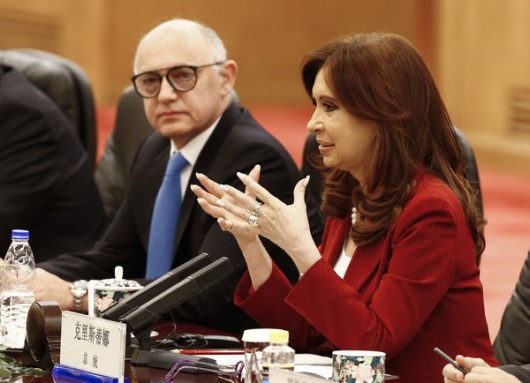
Yesterday Argentine newspaper Clarin interviewed Gary Samore, a former nuclear affairs advisor to President Barack Obama, about the request made to Argentina for it to change the spent nuclear fuel of the Tehran reactor by new fuel containing uranium enriched at a level that would make it difficult for it to be used to manufacture nuclear weapons. The former US advisor confirmed, just in case this was what Clarin was needing, what the Argentine President had stated during her address to the United Nations General Assembly.
Samore, surely with no ill intent, made a mistake with regard to the date of the meetings, which is used by Clarin to fabricate a story that, once again, is only consistent with the bad faith of this media outlet.
Let us look at some facts and dates to clarify the inaccuracies in the Clarin article.
Gary Samore admits that Obama had been negotiating a nuclear deal with Iranian President Mahmud Ahmadinejad since the beginning of his administration in 2008. When, several years later, Argentina, following the same logic, reached a judicial cooperation agreement to make progress in connection with the AMIA bombing case, it was accused of negotiating with a terrorist and denier of the Holocaust, by the same voices that remained silent in the face of actions by the United States. No clearer example of the diplomacy of double standards decried by Cristina Fernandez de Kirchner at the United Nations recently.
The meeting at which Obama’s envoy requested Argentina’s assistance took place in my office on 1 November 2010 at 3 pm and not in 2009. I was not the Foreign Minister in 2009.
The problem referred to by Mr Samore, with regard to Argentina supplying unenriched uranium to Iran, could not have been solved in 2009 as he said because, if so, the lofty attempt by President Lula and Turkish Prime Minister Recep Tayyip Erdogan to negotiate the change from Iran’s enriched uranium to a low grade variety would not have made any sense. Those negotiations were conducted in May and June 2010 and triggered an unusually disproportionate negative reaction on the part of the United States, which opposed the agreement between Brazil, Turkey and Iran. Double standards once again.
When Mr Samore visited Argentina, we had a meeting during which I was joined by the Argentine Foreign Ministry’s leading nuclear advisors. Mr Samore explained that Iran needed to replace the Tehran reactor’s spent nuclear fuel supplied by Argentina during the Carlos Menem administration by new fuel. He further explained that fulfilling the Iranian demand was part of a scheme involving several countries supplying nuclear materials that would enable the United States to continue advancing towards a “still distant” nuclear weapons agreement with Iran.
Mr Samore stated that the options were the following:
The simplest and quickest one was for Argentina to provide the new nuclear fuel, as the original fuel had been designed by Argentina, who owned the intellectual property rights.
Another alternative was for Argentina to authorize Russia to supply the uranium, following the Argentine design.
The last alternative was for the United States or some other country with nuclear capacity to replace the operating core of the nuclear reactor with a new one using other non-Argentine fuel.
At the meeting, Mr Samore explained that the United States could not appear to be making the fuel change for political reasons.
Considering the harsh US reaction against the Brazil and Turkey agreement in May 2010 and the judicial status of the AMIA case, the President instructed me to ask that the request by President Obama’s administration be made in writing, in which case Argentina would lend its cooperation to relieve the tension around nuclear matters in the Middle East.
That was what I conveyed in my reply to Gary Samore, who explained that he had to consult with President Obama. The written request never came, nor did Mr Samore advise me of the reasons for not leaving a record of the request he had made in November 2010.
It is not true either that Argentina did not wish to join a nuclear deal with Tehran, as it was never invited to take part in any meeting, but only to supply an input.
Finally, on 28 September 2011, as I entered the UN building I happened to run into Gary Samore in the lobby. We talked about Iran and I told him that in a few minutes I would be meeting with the Iranian Foreign Minister in order to try to reach a judicial agreement to unblock the AMIA case. His comment was that it was very difficult to negotiate with the Iranians but that dialogue had to be maintained, and wished me success in our negotiations. This was how the United States learnt before any other country about the start of negotiations with Iran in relation to the AMIA case.
www.cancilleria.gob.ar
@CancilleriaAR